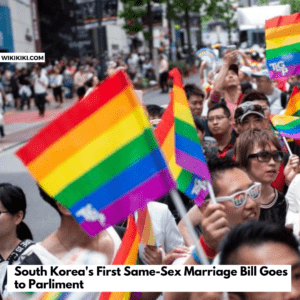Lawmakers in South Korea have taken a significant step towards equality by proposing the country’s first same-sex marriage bill. The bill, introduced by Jang Hye-yeong of the minor opposition Justice party and co-sponsored by lawmakers from various parties, aims to amend the civil code to include same-sex marriages. While the bill faces challenges in passing, it represents a crucial moment in the fight for marriage equality and broader recognition of diverse family structures in South Korea.
Also Read: Uganda Enacts Harsh Anti-LGBTQ Law Including Death Penalty

South Korea currently does not recognize civil same-sex partnerships, as the constitution’s language has typically been interpreted as restricting marriage to opposite-sex couples. Same-sex relations are not criminalized in the country, but LGBTQ+ individuals often live under the radar due to societal attitudes. Calls for legislation against discrimination based on sexual orientation have been met with resistance, particularly from religious groups who argue that such measures would “legalize homosexuality.”
Marriage Equality Bill
The marriage equality bill presented by Jang Hye-yeong seeks to redefine the concept of marriage in South Korea. The current civil code does not recognize same-sex partnerships, as the constitution stipulates that marriage and family should be based on the “equality of the sexes.” This provision has been interpreted as restricting marriage to opposite-sex couples. The proposed bill challenges this interpretation and calls for a more inclusive definition of family.
Also Read: Target Faces Backlash From Customers for LGBTQ+ Support
Jang Hye-yeong’s marriage equality bill seeks to challenge the existing legal framework by amending the civil code to include same-sex marriages. Jang emphasized that the family unit is the foundation of society, emphasizing the importance of recognizing diverse family structures. Although the bill is unlikely to pass, it joins two other bills related to civil unions and in vitro fertilization (IVF) for unmarried women, putting pressure on the government to expand the definition of family beyond traditional criteria.
Social Consensus
Efforts to achieve marriage equality and anti-discrimination legislation have been hindered by a lack of consensus among lawmakers. Opponents often cite social consensus as a reason to oppose equality laws, including same-sex marriage. According to a survey, 52% of respondents in South Korea opposed legalizing same-sex marriage. However, Jang argues that enacting laws is a democratic process that contributes to social consensus. It is essential for lawmakers to engage in discussions and work towards a shared understanding of equality.
Landmark Ruling on Same-Sex Couples’ Rights
In February, a landmark ruling by a South Korean court recognized the legal status of same-sex couples for the first time regarding national health insurance. The ruling came in response to a lawsuit filed by a gay couple, So Seong-wook and Kim Yong-min, after their insurance benefits were terminated due to their sexual orientation. The court acknowledged the difficulties in recognizing same-sex marriage under current common law but emphasized that denying insurance coverage constituted discrimination based on sexual orientation.
International Community
South Korea’s potential move towards marriage equality aligns with advances made by other countries in the region. Australia, New Zealand, and Taiwan have already extended marriage rights to same-sex couples, demonstrating the growing recognition of equality and diversity. In Japan, a court recently ruled that the ban on same-sex unions was unconstitutional. These developments highlight the global momentum towards inclusivity and equal rights for LGBTQ+ individuals.
Also Read: Uganda passes controversial law criminalizing identification as LGBTQ+
Legislative Action
The Marriage Equality Korea civic group, along with other advocacy organizations, stressed the urgency of discussing the proposed bills in the National Assembly. The introduction of bills related to civil unions and in-vitro fertilization (IVF) for unmarried women further emphasizes the need to expand the definition of family and ensure equal rights for all individuals. It is crucial for lawmakers to seize this historic opportunity and enact legislation that promotes inclusivity and equal treatment under the law.
Opposition
While the introduction of the marriage equality bill is a significant step forward, it faces considerable challenges. Past efforts to grant legal rights to same-sex couples have been met with opposition from religious groups who argue that such measures would “legalize homosexuality.” Similarly, anti-discrimination legislation has been blocked on the same grounds. However, it is essential to note that same-sex relations are not criminalized in South Korea.
Conclusion
The introduction of South Korea’s first same-sex marriage bill represents a historic moment in the fight for equality. While the bill’s passage is uncertain, it serves as a catalyst for discussions on marriage equality and the recognition of diverse family structures. Achieving social consensus is crucial in this democratic process, as lawmakers work towards a shared understanding of equality. South Korea’s progress towards marriage equality reflects the broader global movement towards inclusivity and the recognition of LGBTQ+ rights.
Also Read: Shanghai Records Hottest May Temperature in Over 100 Years


















+ There are no comments
Add yours